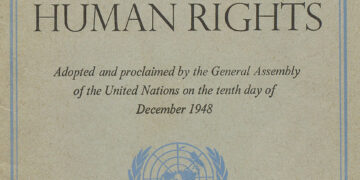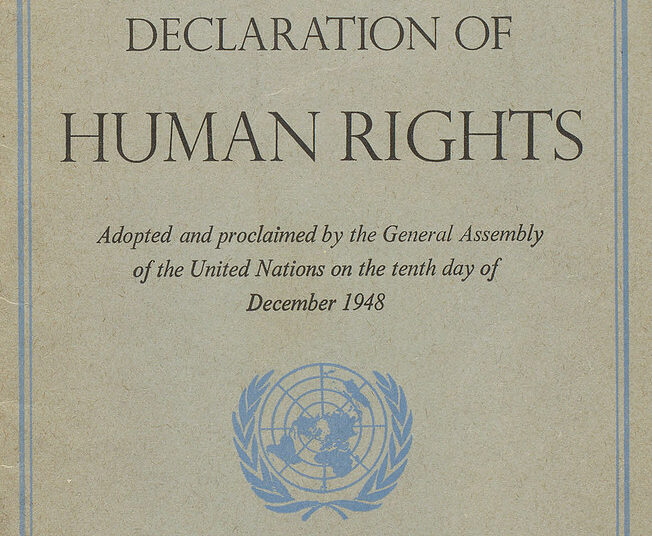Last updated on April 8th, 2021 at 12:45 pm
IOF has submitted the following statement, cosigned by organizations around the world, in response to the request for input by HRC’s so-called Independent Expert on gender, sexual orientation, and gender identity. We have also provided the statement to ambassadors and their missions in Geneva.
‘Begin at the Beginning’: A Response to the 2021
‘Call for input to a thematic report: Gender, sexual orientation and gender identity’
“Where shall I begin, please your Majesty?” asks the White Rabbit in Lewis Carroll’s Alice in Wonderland. The King’s answer offers timeless wisdom: “Begin at the beginning.” In our response to the 2021 “Call for input to a thematic report: Gender, sexual orientation and gender identity,” whose stated purpose is “to inform the Independent Expert’s report to be presented to the 47th session of the Human Rights Council,” we begin at the beginning of the Human Rights Council—then the Human Rights Commission—and its historic issuance in 1948 of the Universal Declaration of Human Rights.
As what René Cassin, one of the principal drafters, called “the first document of an ethical sort that organized humanity has ever adopted,”[1] the UDHR has become, in the words of Professor Hans Ingvar Roth, “a moral guiding star,”[2] fulfilling the hope of Eleanor Roosevelt that it would serve as “the international Magna Carta of all men everywhere.”[3] Its foundational influence on human rights is unprecedented and unparalleled. “The most impressive advances in human rights,” noted Professor Mary Ann Glendon, “owe more to the moral beacon of the Declaration than to the many covenants and treaties that are now in force.”[4]
But Professor Glendon also sounded a somber warning. “Time and forgetfulness are taking their toll,” she wrote in 2001, as “the Declaration has come to be treated more like a monument to be venerated from a distance than a living document to be reappropriated by each generation.” For it is being “compromised by the practice of reading its integrated articles as a string of essentially separate guarantees. Nations and interest groups continue to use selected provisions as weapons or shields, wrenching them out of context and ignoring the rest… Forgetfulness, neglect, and opportunism have thus obscured the Declaration’s message that rights have conditions—that everyone’s rights are importantly dependent on respect for the rights of others, on the rule of law, and on a healthy civil society.”[5]
And what is the foundation of a healthy civil society? The UDHR leaves no doubt by declaring, in the only provision mentioning a group unit as possessing human rights, that “The family is the natural and fundamental group unit of society and is entitled to protection by society and the State.”[6] In other words, the family is not a creation of or subject to the State, but exists prior to the State and possesses inherent dignity and rights which States are morally bound to respect and protect.[7]
Nor is the family a mere social construct to be defined and redefined by ephemeral societal whims, for “in the precise and elegant terms of the Universal Declaration,” explained Professor Richard Wilkins, the family “is the ‘natural and fundamental group unit of society’ precisely because mounting evidence attests that the survival of society depends on the positive outcomes derived from the natural union of a man and a woman.”[8]
Expressed another way, “the roles of a father and a mother, and of children with respect to them,” wrote Michael Novak, former ambassador to the Commission on Human Rights, constitute “the absolutely critical center of social force”[9]—what Pope Francis has called “a unique, natural, fundamental and beautiful good for people, families, communities and societies” arising from “the “the complementarity between man and woman…. Children have a right to grow up in a family with a father and a mother capable of creating a suitable environment for the child’s growth and emotional development.”[10] It is the same truth expressed in the UDHR’s acknowledgment that “Motherhood and childhood are entitled to special care and assistance,”[11] and in the statement of the Declaration of the Rights of the Child that “mankind owes to the child the best it has to give.”[12]
Building on the UDHR provision that the natural family is “entitled to protection by society and the State,” various UN documents have stated that the family is entitled to “comprehensive protection and support.”[13] More specifically, Member States are bound by the International Covenant on Economic, Social, and Cultural Rights to accord to the family “the widest possible protection and assistance.”[14] We affirm in the strongest possible terms that not only is it not discriminatory to fulfill this treaty obligation, but failing to do so constitutes discrimination against society’s natural and fundamental group unit.
To the extent that the Independent Expert implies otherwise (as appears likely, for example, in his mention in paragraph 5 of “protection of the family” as possibly “hinder[ing] the adoption of legislative or policy measures aimed at addressing or eradicating violence and discrimination based on sex, gender, sexual orientation and gender identity”), we object and call for a return to the foundational principles set forth in the UDHR.
We hasten to express our full support of the UDHR’s “recognition of the inherent dignity and of the equal and inalienable rights of all members of the human family” as “the foundation of freedom, justice and peace in the world,”[15] and we deplore and denounce all violence against anyone. But ensuring such protection against violence does not negate Member States’ obligation to provide “the widest possible protection and assistance” to the natural family.
We further express our full support for the UDHR’s recognition that “Everyone has the right to freedom of thought, conscience and religion,” a right that “includes freedom to change his religion or belief, and freedom, either alone or in community with others and in public or private, to manifest his religion or belief in teaching, practice, worship and observance.”[16] This right has been reaffirmed in UN documents such as the Beijing Declaration, which states that “freedom of thought, conscience, religion and belief… contribut[es] to the moral, ethical, spiritual and intellectual needs of women and men” and “is inalienable and must be universally enjoyed,”[17] and by treaty protection in the Convention on the Rights of the Child declaring that “freedom of thought, conscience and religion” shall be respected by States Parties and “may be subject only to such limitations as are prescribed by law and are necessary to protect public safety, order, health or morals, or the fundamental rights and freedoms of others”[18] (emphasis added).
To the extent that the Independent Expert implies otherwise (as appears likely, for example, in his mention in paragraphs 6, 8, and 9 of possible limitation of human rights of LGBT persons by religious narratives or values, or by initiatives in connection with freedom of religion, or by statements of religious leaders), we object and call for a return to the foundational principles set forth in the UDHR.
We also express our full support for the UDHR’s recognition that “Everyone has the right to freedom of opinion and expression; this right includes freedom to hold opinions without interference and to seek, receive and impart information and ideas through any media and regardless of frontiers.”[19] It takes no imagination to recognize an affront and possible threat to that principle in the Independent Expert’s attempt to collect names of those who disagree with him through his repeated requests (including in paragraphs 4-11) for examples of statements or organizations opposing “comprehensive sexuality education” or “gender ideology.” No UN agency or appointee should be permitted to engage in action that historically has often been the prelude to encroachment on the freedom of opinion and expression recognized by the UDHR as a fundamental human right.
We urgently call upon the Human Rights Council to return to the foundational principles memorialized by the wise drafters of the UDHR at the beginning of the Human Rights Commission. Only thus can the inherent dignity of individuals and the natural family be accorded the respect and protection to which they are entitled.
Respectfully,
International Organization for the Family (Howard Center for Family, Religion and Society)
The Heritage Foundation
Center for Family and Human Rights
United Families International
American Family Association of New York
Ruth Institute
CitizenGo, Spain
Latin American Alliance for the Family
Family Policy Institute, South Africa
Family First, New Zealand
Novae Terrae Foundation, Italy
Real Women of Canada
Provive, Venezuela
Institute for Family Policy, Spain
Native Peoples’ Coalition for the Family
FamilyPolicy.RU Advocacy Group, Russia
[1] René Cassin, Nobel Lecture, December 11, 1968, https://nobelprize.org/prizes/peace/1968/cassin/lecture.
[2] Hans Ingvar Roth, P. C. Chang and the Universal Declaration of Human Rights (Philadelphia: University of Pennsylvania Press, 2016), 135.
[3] Statement to the United Nations General Assembly at the adoption of the Universal Declaration of Human Rights, December 9, 1948, available at https://erpapers.columbian.gwu.edu/statement-united-nations-general-assembly-universal-declaration-human-rights-1948.
[4] Mary Ann Glendon, A World Made New: Eleanor Roosevelt and the Universal Declaration of Human Rights (New York: Random House, 2001), 236.
[5] Ibid., xvii, 239.
[6] Universal Declaration of Human Rights, art. 16(3).
[7] As expressed also in the Charter on the Rights of the Family: “the family, a natural society, exists prior to the State or any other community, and possesses inherent rights which are inalienable.” https://vatican.va/roman_curia/pontifical_councils/family/documents/rc_pc_family_doc_19831022_family-rights_en.html.
[8] Richard G. Wilkins in A. Scott Loveless and Thomas B. Holman, eds., The Family in the New Millennium: World Voices Supporting the Natural Clan, Volume 1: The Place of Family in Human Society (Westport, Connecticut: Praeger, 2007), xiv.
[9] Michael Novak, “The Family out of Favor,” Harper’s Magazine 252, no. 1511 (1 April 1976): 38.
[10] Opening address to Humanum Conference, Rome, November 17, 2017, https://vatican.va/content/francesco/en/speeches/2014/november/documents/papa-francesco_20141117_congregazione-dottrina-fede.html.
[11] Universal Declaration of Human Rights, art. 25(2).
[12] Declaration of the Rights of the Child, preamble.
[13] See International Conference on Population and Development, Programme of Action, principle 9; para.5.1; Beijing Plan of Action, Fourth World Conference on Women, 29; Copenhagen Declaration on Social Development, World Social Summit for Development, 26.h; Istanbul Declaration on Human Settlements, United Nations Conference on Human Settlements, 31; A World Fit for Children, 15.
[14] International Covenant on Economic, Social and Cultural Rights, art. 10.1.
[15] Universal Declaration of Human Rights, art. 16(3).
[16] Universal Declaration of Human Rights, art. 18.
[17] Beijing Plan of Action, Fourth World Conference on Women, 12, 24.
[18] Convention on the Rights of the Child, art. 14.1,3.
[19] Universal Declaration of Human Rights, art. 19.




















Discussion about this post